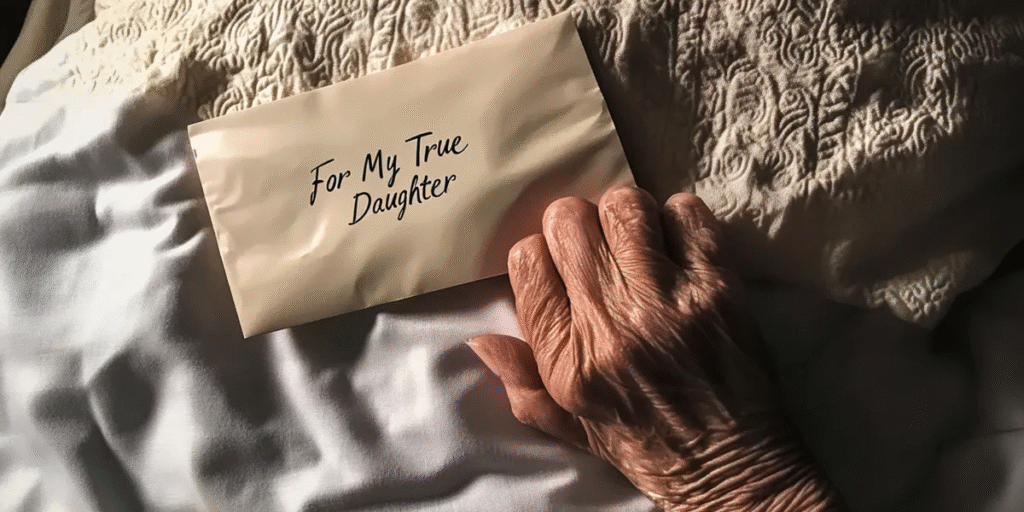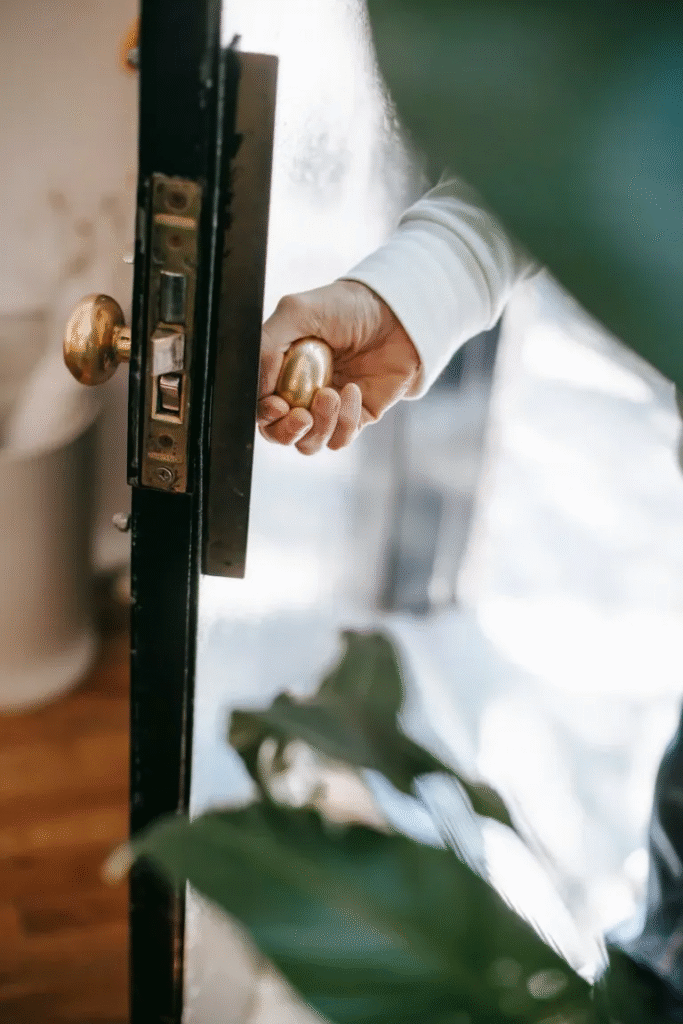
When Mom got sick, my sister suddenly transformed into the “perfect daughter.” She moved into Mom’s house, shut me out, and insisted she had everything under control. But I knew better. My sister had never done anything without a hidden agenda. Still, there was nothing I could do—until the doctor handed me a note from Mom that changed everything.
I used to wonder how two people raised under the same roof could turn out so different. It wasn’t until we became adults that the contrast between my sister and me became impossible to ignore. Our mother raised us on her own, and as I got older, I began to truly grasp how much she sacrificed to give us a life.

I still remember that tiny apartment from my childhood—how it creaked with every step and never seemed to hold in the warmth during those bitter winters. The wind would whistle through the cracks in the windows like a haunting lullaby, and no matter how many blankets we piled on, the chill always found a way in.
Mom worked herself to the bone, juggling two jobs just to keep a roof over our heads. But even with all her effort, it was never quite enough.
Some nights, our cupboards were nearly bare. I’ll never forget the quiet knock on the door and the comforting smile of our neighbor, Mrs. Jenkins. She’d stand there with a warm pot of soup or a plate of pasta in her hands—never asking questions, just offering kindness. To me, those meals tasted better than anything in the world. They tasted like hope.

Back then, I didn’t fully grasp what those meals truly meant—I just knew I wasn’t going to bed hungry. That was enough for me.
But even as a child, I noticed things. I noticed how Mom never ate with us. She’d sit nearby, smiling softly, insisting she wasn’t hungry. But I saw through her. I saw the way she watched us eat, the quiet sacrifice behind her tired eyes. She was giving us everything she had—every scrap of food, every ounce of strength.
It wasn’t always like that. Over time, things started to change. Mom landed a better job—one that didn’t leave her as worn down. Slowly, bit by bit, we began to climb out of the shadows of poverty. It wasn’t easy, but with her relentless determination, we found our way toward something better.

Mom eventually saved enough to move us into a better home—a place where the windows didn’t rattle in the wind and the walls held in the warmth. Life slowly began to feel normal, even hopeful. In time, both Samira and I made it to college, something that once felt like an impossible dream.
But Samira… she never remembered those lean years the way I did. She was too young to carry the weight of those memories—too little to understand the silent sacrifices Mom made to keep us afloat.
Maybe that’s why she turned out the way she did. How can I put it? A little selfish. A little too carefree. While I carried the past with me, Samira seemed to drift through life, untouched by the struggles that had shaped us.

Even after college, Samira never really found her footing. She bounced from one idea to the next, never settling, never serious. She didn’t want a job—she wanted freedom. And whenever her bank account ran dry, she turned to Mom, knowing she’d give in.
She spent money like it grew on trees, like Mom’s sacrifices had no weight. I bit my tongue more times than I can count, but deep down, it hurt to watch.
Then one day, everything changed.
Mom called me out of the blue. Her voice sounded softer than usual, almost too calm.
“Is everything okay?” I asked, already sensing something wasn’t right.
“Yes, yes,” she said gently. “I just need to talk to you… Can you come over?”
There was a pause in her tone—just long enough to make my stomach twist.

Her words echoed in my mind the entire drive over. Something about her voice—too calm, too measured—left me with a knot in my stomach. Mom never called me out of the blue like that. She was strong, independent, always handling things on her own. This was… different.
By the time I pulled into the driveway after work, the sun was dipping low, casting long shadows across the porch. The front door was slightly ajar, which only added to my unease.
I stepped inside, heart pounding. “Mom?” I called out, my voice wavering.
“I’m in the kitchen, honey,” she answered, her voice warm but tired.
That’s when I knew—something was wrong. Deeply wrong.

I stepped into the kitchen and found her sitting at the table with a cup of tea cradled between her hands. But something about her looked… smaller. Her hands, once always in motion, now rested still and fragile on the table. And her eyes—normally so full of light—seemed dim, as if the weight of something heavy was pressing down on her spirit.
I sat across from her, trying to keep my voice steady. “What happened? What did you want to talk about?”
She looked at me for a long moment, then took a slow, trembling breath.
“I went to the doctor today,” she said, her voice barely above a whisper. “And… I’m afraid it’s not good news.”
My heart sank before she even finished the sentence. I knew. I just knew.

My heart pounded so loudly I could barely hear my own voice. “Why? What’s wrong?” I asked, dreading the answer.
Mom looked down at her tea, then back up at me with eyes that held years of strength… and now, quiet resignation.
“It’s my heart,” she said softly. “The doctors say I have about a year. Maybe less.”
Her words hit me like a freight train. I felt the air rush out of my lungs as the room began to spin.
“No… No, there has to be something they can do,” I stammered, my voice cracking. “Surgery? Medication? I’ll pay whatever it takes. I’ll find the best doctors—just tell me what to do.”
She reached across the table and gently took my hand. Her touch was warm, but it trembled. That scared me more than anything.
“There’s nothing more they can do,” she said quietly. “It’s time, sweetheart. I just wanted you to hear it from me.”

“A year is the most I’ll get—with treatment,” Mom said, her voice calm in a way that only made it harder to hear. “Without it… I might not even have two months.”
I shook my head slowly, the words refusing to settle. “No… no, this can’t be true,” I whispered, my voice breaking. Tears welled up before I could stop them, blurring her face like a fading memory.
Mom gave me a soft, knowing smile—the kind that said she’d already made peace with what I couldn’t yet accept.
“But it is true,” she said gently. “I guess a lifetime of stress, overwork, and putting myself last finally caught up to me.”
She looked away for a moment, out the kitchen window, as if she could see the years slipping past in the wind. And just like that, I realized—this was a woman who had given everything… and now had almost nothing left.

I couldn’t hold back any longer. I got up, moved to her side, and wrapped my arms around her. She felt smaller in my embrace than I remembered—frail, like something precious that might break.
“We’ll get through this, Mom,” I whispered, choking back tears. “You’re not alone. I’ll be here with you—every step of the way.”
She leaned her head against mine, gently stroking my hair the way she did when I was a child scared of the dark.
“I know, sweetheart,” she murmured. “I’ve always known I could count on you.”
Then she pulled back slightly and looked me in the eye. “But please… don’t tell Samira. Not yet.”
“What?” I blinked. “Why not? Mom, she’s still asking you for money like nothing’s wrong. You need every cent now—for treatment, for yourself.”
She sighed, the weight of years in her breath. “I know. But Samira… she’s not ready. And I want to keep things peaceful for just a little while longer.”

“She’s living off her new boyfriend right now,” Mom said with a tired half-smile. “So for now… things are quiet. We can breathe for a little while.”
I shook my head, frustration bubbling beneath the sorrow. “This isn’t right, Mom. You shouldn’t have to tiptoe around her—not now, not with everything you’re going through.”
She reached out and gently touched my arm. “I know how it looks. But I’ll tell her… when the time is right. I just need a little more time.”
There was something final in her voice—not fear, not denial, but a kind of maternal instinct I knew all too well. She was still trying to protect both of us, even when she was the one who needed protecting most.
I nodded slowly, even though every part of me screamed that it wasn’t fair. Because it wasn’t.

It was almost exactly a month after our quiet kitchen conversation when Mom finally told Samira the truth. She hadn’t planned to—until Samira showed up unannounced, fresh off another breakup, asking for money like nothing in the world had changed.
I wasn’t there for the conversation, but I knew it had happened the moment Samira barged into my apartment without knocking. She stormed in like she owned the place, dropped her bag by the door, and flopped onto my couch with a scowl.
“I don’t want you visiting Mom,” she snapped, skipping any kind of greeting.
I stared at her, stunned. “What? What are you talking about?”
She crossed her arms like a defiant teenager. “She doesn’t need your pity. You’ve done enough already.”
The anger in her voice didn’t match the situation—it felt defensive, misplaced, like she was lashing out to protect herself from a truth she couldn’t handle.

“Are you out of your mind?” I snapped, standing up. “Mom is sick, Samira. Really sick. I’m going to see her—because someone actually needs to be there for her.”
She didn’t even flinch. Her arms stayed crossed, her expression cold and sharp.
“I know why you’re suddenly so concerned,” she said, her voice laced with bitterness. “You’re just trying to make sure you get all of her inheritance. But let me save you the trouble—that’s not going to happen.”
I stared at her, stunned. “Are you serious right now? You think I’m doing this for money?”
She shrugged, smug and defensive at once.
“I don’t care about the inheritance,” I said through gritted teeth. “I care about Mom. I’m trying to help her—not bleed her dry like you have for years. Or are you just assuming everyone’s as selfish as you are?”
Her face flushed, and for a second, her mask cracked—but just for a second.

Samira rolled her eyes, her tone dripping with condescension. “Oh, please. Don’t pretend. Mom always loved me more—she gave me more money, supported me more. And now that she’s sick, you’re just trying to grab whatever’s left before she’s gone.”
My jaw clenched. I couldn’t believe what I was hearing.
“That’s the most ridiculous thing you’ve ever said,” I shot back. “If you actually believe that, then you’ve never known Mom at all. I’m going to keep visiting her. I’m not going to sit back and let her go through this alone—someone has to be there for her.”
Samira smirked and stood up like she was delivering a grand announcement.
“Don’t worry about that,” she said, brushing imaginary lint off her sleeve. “I’ve already planned everything. I’m moving in with Mom. I’ll be the one taking care of her.”
The arrogance in her voice made my blood boil. She was already claiming control—like it was a prize.
I narrowed my eyes. “Taking care of her? Or controlling her?”

“You?” I scoffed, my voice rising. “Since when are you so caring? You’ve never cared about anyone but yourself.”
Samira’s eyes flashed with anger. “That’s not true,” she snapped. “I’ve always cared about Mom. And now she needs me. So don’t even think about coming over—I won’t let you in.”
Her words hung in the air like a slap. Then, without another word, she grabbed her bag, spun on her heel, and walked out the door—like she’d just won some kind of twisted victory.
I stood there, frozen, staring at the door long after it closed. My hands were still shaking, and my heart ached—not just for Mom, but for everything this family had become.

I couldn’t believe the nerve. As much as I wanted to think Samira was just being dramatic, deep down, I knew the truth—she wasn’t doing this for Mom. She was doing it for herself. Like always.
But what shocked me most was that she wasn’t bluffing. She actually followed through. Every time I tried to visit, there was an excuse waiting like a brick wall.
“Mom’s sleeping.”
“She’s not feeling well.”
“She had a doctor’s appointment.”
Over and over again, a rotating door of lies to keep me away.
It broke me.
So, I did the only thing I could think of—I texted Mom. Let me know when Samira won’t be home, I wrote. Just give me a window. I need to see you.
I waited, hoping that behind Samira’s smokescreen, Mom still had enough strength—and freedom—to reach out.

One quiet afternoon, my phone buzzed with a message that made my heart skip a beat.
Samira went to the mall. You can come now.
It was from Mom.
Without wasting a second, I grabbed my keys, stopped by the grocery store to pick up some of her favorite things—fresh fruit, soup, herbal tea—and drove straight to her house, my hands trembling on the steering wheel the entire way.
When I walked in, the familiar scent of home greeted me. Mom was lying on the couch, a blanket pulled up to her waist, the soft hum of the TV playing in the background. She looked exhausted—like the illness was slowly draining the life from her—but when her eyes met mine, they lit up with warmth I hadn’t seen in weeks.
“There you are,” she whispered with a smile. “I was starting to think you forgot about me.”
“Never,” I said, setting the bags down and kneeling beside her. “I missed you so much.”

“Not too bad,” Mom said, forcing a smile that didn’t quite reach her eyes. “I’m managing.”
I knelt beside her and gently placed the grocery bag on the floor. “I brought you some things—your favorite tea, some fresh fruit. Thought it might cheer you up a little.”
Her smile softened, but then something shifted. Her expression turned somber, and the warmth in her eyes flickered with doubt.
“Thank you, honey,” she said quietly. Then, after a pause: “But… why haven’t you been visiting me?”
I looked up, confused. “What?”
“Samira told me…” Her voice faltered. “She said you didn’t want to come. That I’d become a burden.”
My heart stopped. For a moment, I couldn’t breathe.
“She said what?”
Mom nodded slowly, her gaze falling to her lap. “She said you were too busy. That you thought I wasn’t worth the trouble anymore.”
I stared at her, stunned—and then anger began to rise, not just at Samira, but at the hurt she had caused.
“Mom,” I said, my voice trembling, “I would never say that. Never. Samira locked me out. She made excuse after excuse to keep me away from you. I’ve been trying. I’ve been begging to see you.”

My heart stopped. I could barely process what I was hearing.
“She said what?!” I gasped, the words leaving my mouth in a burst of disbelief and fury. “Mom, I didn’t come because Samira wouldn’t let me! Every time I tried, she had an excuse—‘You were sleeping,’ ‘You didn’t feel well,’ ‘You were out.’ She built a wall around you and shut me out.”
I took a shaky breath, my voice softening. “The second you said I could come, I dropped everything and got here.”
Mom nodded slowly, her eyes searching mine. “I see,” she said, quietly, as if pieces were starting to fall into place.
I hesitated, then asked the question that had been gnawing at me for weeks. “And… how is it with Samira? Does she help you at all?”
There was a pause—just long enough to make my chest tighten.
Mom looked away, then back at me. Her expression was tired, conflicted.
“She tries,” she said, carefully. “But it’s more about being here than actually… helping. She’s on her phone a lot. She doesn’t like doing the hard things. Sometimes I feel like I’m taking care of her.”